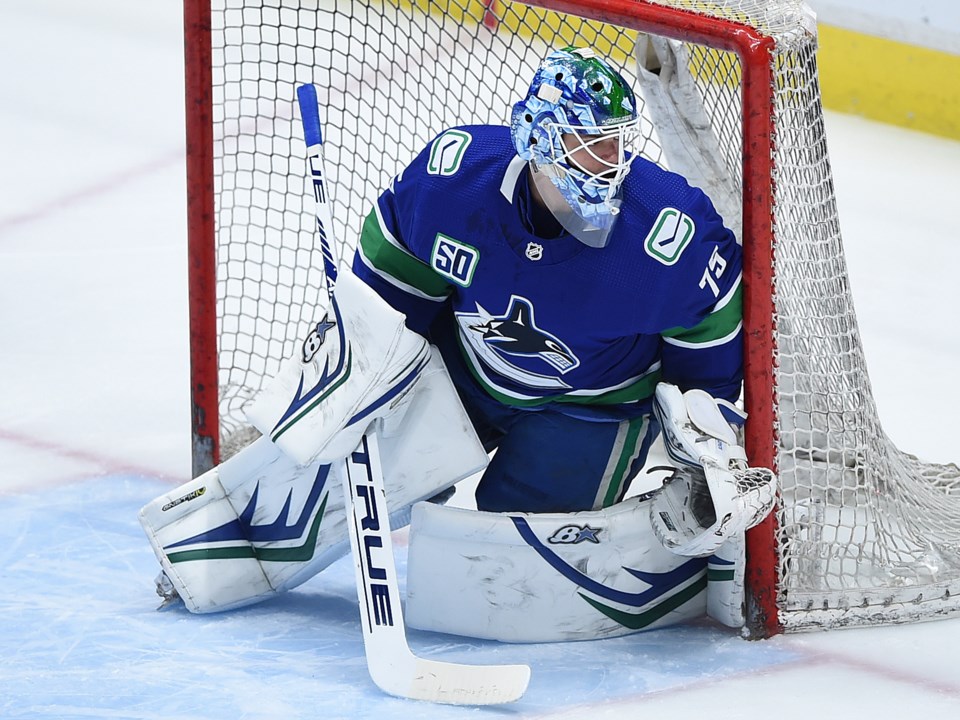The NHL has firm plans in place for the 2020-21 season. The season kicks off on January 13th with a 56-game schedule planned and the league has reported that they “believe” that the Canadian teams will be able to play in their home arenas, though the agreement has yet to be finalized.
The plan includes a “taxi squad” for each team: a group of players that will technically be assigned to the AHL, but will stay with their NHL team. This will make call-ups in the midst of the COVID-19 pandemic a little easier for all teams, but it’s essential for three Canadian teams whose AHL affiliate is in the U.S.: the Vancouver Canucks, Calgary Flames, and Edmonton Oilers.
With Canada requiring a quarantine period for people entering the country, there was simply no way for those three teams to function in the coming year as they couldn’t call up players from the AHL in case of injuries or positive COVID-19 tests.
Of course, it’s still unclear when or if AHL affiliates will even be playing. While the NHL’s plans are set, there’s a lot more uncertainty surrounding the AHL season.
The AHL’s Board of Governors took a step toward certainty on Wednesday, stating that the AHL has a “structural framework for an AHL season that will begin on February 5, 2021.”
Whether all 31 AHL teams will participate in the coming season or if the schedule will be anything approaching a normal AHL season remains to be seen. Obviously, the teams based in Canada won’t be able to play U.S. teams for the same reason the NHL has created an all-Canadian division for the coming season.
Also, since many AHL teams won’t be able to have any fans in buildings, it could be difficult financially for many teams to operate. Even more than the NHL, the AHL is a gate-driven league: they need fans in the building to have any meaningful revenue. 12 of the 31 teams in the AHL are not owned by an NHL team — in order to operate, those teams would likely need some form of NHL support.
“I can’t say 31 teams will play,” said AHL president Scott Howson a month ago, “but I am encouraged that there is a strong desire for virtually every one of our teams to play.”
According to Syracuse Crunch owner Howard Dolgon, speaking to Ben Birnell of the Utica Observer Dispatch, AHL teams will declare by January 4th whether they intend to play this season or not. The Canucks' affiliate the Utica Comets, at least, want to play and Dolgon suggested that the Comets and Crunch could play a significant number of games against each other, simply to help develop players.
Syracuse and Utica are an hour apart. An AHL season that consists primarily of geographically-close teams facing each other for a shortened season might make sense.
So, what does this mean for the Canucks and particularly their 4-6 man taxi squad?
The gap between the start of the NHL and AHL seasons means the Canucks could potentially switch up their taxi squad over the first few weeks of the season. The Canucks could keep a few of their young prospects — Nils Höglander, Jack Rathbone, and Kole Lind — on the taxi squad to start the season, giving them an opportunity to practice with the team for a few weeks and potentially even get into games if injuries strike.
Once the AHL season starts, those players could be sent to Utica to get ice time and the taxi squad could instead be filled by older players who would receive less benefit from playing in the AHL: Sven Baertschi, Tyler Graovac, Justin Bailey, Ashton Sautner, and even Loui Eriksson. Perhaps that’s not the approach the Canucks would take, but it’s something to consider.
Where this gets particularly interesting is goaltending. The Canucks will be required to have at least one goaltender on their taxi squad and would want to have one anyways, as having to wait 14 days for a backup goaltender to quarantine in case of injury would be a disaster.
The team’s top prospect in net is Michael DiPietro, but here’s the issue: do they want their top goaltending prospect sitting on the taxi squad for an entire season, only playing a game if one or both of Braden Holtby or Thatcher Demko gets injured? Getting practice time with goaltending coach Ian Clark would be valuable for DiPietro, but not at the expense of actually playing in games.
Starting the season on the taxi squad and getting a couple of weeks of practice time in with Clark would be valuable, but then it would make sense to send him down to the Comets so he can start the majority of their games. After that, though, who would be the goaltender in the Canucks’ taxi squad?
Jake Kielly and Arturs Silovs are the only other goaltenders currently signed by the Canucks, which is a concern considering neither of them are NHL ready. Kielly, who played in the ECHL last season, could potentially be on the Canucks’ taxi squad, but there is another option: signing a veteran backup that would be willing to sit on the taxi squad for a chance to potentially play NHL games in the coming season.
There’s even a goaltender on the free agent market with ties to the Canucks: Cory Schneider.
Schneider was reportedly close to signing with the New York Islanders months ago, but he still doesn’t have a contract. While Schneider had some seriously dreadful seasons with the New Jersey Devils over the past few years, he was at one point legitimately one of the best goaltenders in the NHL and, at 34, might just be looking for one last shot at proving himself. Is a spot on the Canucks’ taxi squad his best chance?


.JPG;w=120;h=80;mode=crop)

